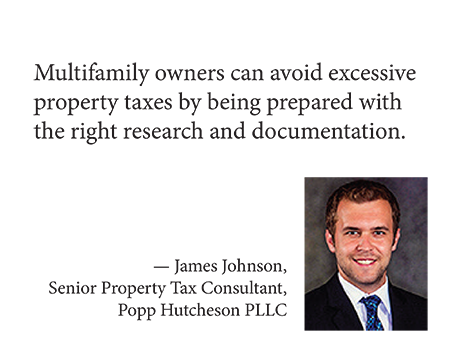Property tax systems vary from state to state across the country, with differing procedures in each assessor’s jurisdiction. Complicating things further, the personalities of assessors and their staff influence the way they interact with property owners or their agents.
It is the responsibility of the property owner or their agent to learn and adapt to the procedures and behaviors at work in their assessor’s offices. However, there are universal pre-emptive steps that property owners in any jurisdiction can take to combat excessive valuations. These property-specific action items and best practices can significantly increase the chances of a successful valuation protest.
1. Document Property Financial Statements
In most appraisal systems, income-producing apartment property will be valued using the income approach. Arguably the most important pieces of information the apartment owner can present in protesting assessed values are the property’s rent rolls and profit-and-loss statements. The timely preparation and completion of these documents prior to a protest is essential to any discussion of fair market value. Key line items such as potential gross income, vacancy and collection loss, and net operating income can assist in negotiating lower assessed values. Market rent, in-place rents and occupancy are key indicators on a rent roll and should be shared with assessors, in most cases, to help them determine how a property is performing.
2. Conduct Market Rent Surveys
Collaborating with property managers to finalize market rent surveys can provide extremely valuable evidence to discuss with the assessor. Most jurisdictions rely on general market data to compute values across the submarket. Market surveys specific to a property typically entail more reliable data and can be used to strengthen the property owner’s market value analysis.
3. Vet Comparable Sets
In addition to a market value analysis, many jurisdictions allow taxpayers to present an equity argument. In an equity claim, property owners or their agents will be looking at assessed values of the subject property’s set of comparables, which are similar properties in the area that can provide reference points in determining market value. If the appraiser’s list of comparables contains apartments not found on the market survey, the taxpayer will have a good reason to request that those be removed from the set being discussed. This strategy is valuable when an appraiser or assessor is using higher-class apartments in the subject property’s submarket, thereby inflating the equitably assessed value.
4. Document Deferred Maintenance and Bids
An argument often heard during valuation protests is “my property has deferred maintenance and therefore should be valued at a discount.” This argument will be more likely to succeed if the taxpayer validates their assertions using contractor bids, pictures or some proof of the amount of maintenance that needs to be done. Obtain bids before the valuation date, detailing work that needs to be done, including the cost of materials and labor. Also before the valuation date, document damages with pictures, if possible. Following this advice will differentiate the subject property from a long list of others claiming deferred maintenance with no support for the cost of repairs.
5. Learn Relevant Tax Laws
Property owners should educate themselves about the property tax system in their property’s state and specific jurisdiction. Deadlines play a very important role, so make sure to meet and understand them. Missing a deadline can forfeit the opportunity to contest an assessed value, precluding relief for an excessive appraisal. Property tax laws and local regulations can be daunting, and the avenues that lead to success can be easily overlooked. In some situations, the property owner will want to speak with a local property tax professional to explore available options.
6. Build and Maintain Assessor Relationships
It is important to realize that the assessor assigned to a protest will likely be someone the taxpayer will be interfacing with throughout the valuation process and potentially for the entire term of property ownership. Integrity and honesty in every interaction with the assessor will help to establish trust and strengthen this relationship over time, which will benefit the taxpayer in the long run. The simple act of beginning a dialogue with the assessor early in the protest process can increase a property owner’s chances of reaching a timely and successful settlement. Advance completion of financial statements that could support a tax protest should be an annual priority for any property owner, as this data is invaluable in arguing for a lower assessment.
While this sounds like a routine process for most property owners, the assessment timeline is different in every jurisdiction and may not coincide with your typical year-end financial audit. Finalizing market-rent surveys and collecting bids for deferred maintenance will add to the chances of success. Learning the property tax rules and deadlines affecting the property, or having an educated team versed in the state or local market, will directly impact success. Finally, building long-lasting relationships with assessors based on openness and reliability is not only common courtesy, but can make assessors more receptive during the appeal process, and therefore increase the likelihood of achieving desired results.
— James Johnson is a senior property tax consultant in the Austin, Texas, law firm of Popp Hutcheson PLLC, which focuses its practice on property tax disputes and is the Texas member of American Property Tax Counsel, the national affiliation of property tax attorneys.


